Choosing the perfect framework for your web development is very important because of the various factors involved with it. The right framework enables the smooth and efficient functioning of your web project. Web development frameworks are an essential component that assists in the development of web applications, APIs, and complex websites.
Briefly, web development frameworks are used by programmers worldwide for creating feature-rich web-based applications. Web applications are a combination of front-end and back-end frameworks, and each of them has their strength and weakness. However, to decide the right framework out of so many options available in the market is no less a task. It is up to you to precisely evaluate which one accommodates all your requirements in one go.
The best front-end web development framework enables the development of a world-class user interface and helps frame the application’s overall experience. Where best back-end web development framework enables adding robust features and functionalities to the website, with the help of programming language.
Choosing the best web development framework can be challenging with so many options available. There are many factors one should consider before finalizing which one is perfect for your project. A few considerations and factors include:
- Ease of installation
- License
- Learning Curve
- Scalability
- Libraries
- In-built Templates
- Coding Simplicity
- Documentation
- Community Support
- Testing
- Performance
In this competitive environment getting a product ready and launching in the market as early as possible is better for attracting customers. Hence, enterprises are always in favor of a framework that enables rapid product development.
Now let us understand which is suitable for your web application development project. Listed below have made their way to the top web development frame in 2021 list;
1) Django
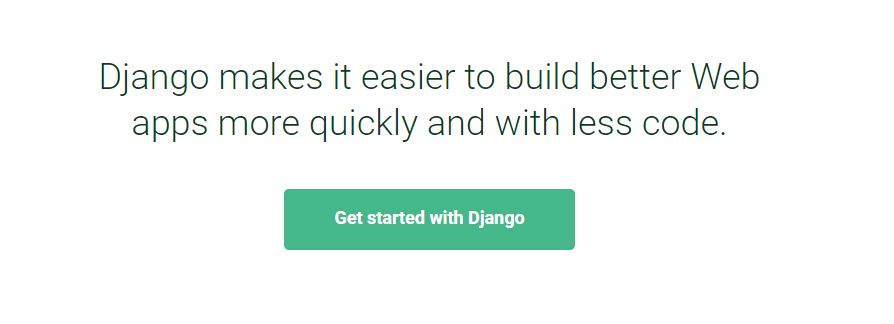
In the year 2021, Django has made it to the list of the best web development frameworks because of its versatility. Django is a Python-based free and open-source back-end framework, which is the programmer’s choice to simplify Python syntax. It follows the Model-View-Template (MVT) architectural pattern. Hence developers can create highly scalable, reliable, and great web apps with one of the most original programming languages. At the same time, the modern and holistic approach towards problem-solving makes it a preferred programming framework.
-
-
- Features: Scalability, URL routing, Template Engine, Authentication Mechanism, Data Schema Migration, ORM or object-rational-mapper, MVP for app development possible, Essential libraries & modules, and Community Support.
- Who uses Django?: Trello, Bitbucket, Instagram, Spotify, Dropbox, Disqus, Prezi, Pixaby, and Opera
-
2) Laravel

Laravel is a PHP based framework and one of the most used back-end frameworks for creating the most intuitive web apps. Laravel works as per the MVC architectural pattern. Famed for gaining sophistication, clarity, and readability programmers rely on Laravel to integrate amazing functionalities into web apps such as making the web app interactive, offer real-time functionality such as live broadcasts, events, etc. Laravel also makes the testing phase easy by removing any framework regression through its in-built unit test feature. Moreover, the Artisan interface comes with pre-generated features so that developers need not develop a project from scratch and can use existing resources.
-
-
- Features: In-built templates, API Integration, Resolution to Basic Vulnerabilities, Authentication Mechanism, Auto Testing, Cashing, and Routing.
- Who uses Laravel?: InvoiceNinja, BBC, 9GAG, Pfizer, FedEx, October CMS, and Flarum
-
3) Express
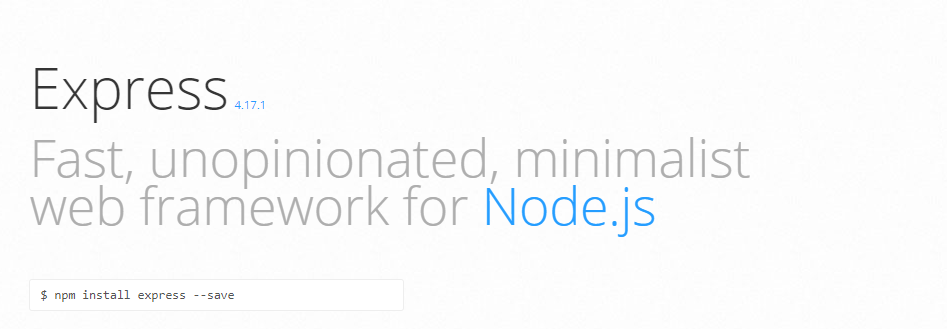
The popularity of the open-source, Node .js enabled express to gain traction, and in no time, it became one of the most used back-ends web frameworks. Express supports JavaScript, which is a widely used language and is easy to learn. Programmers prefer Express for the fact that it is highly flexible and come with a range of tools; it is also said to be an essential component of Mean Solution Bundle. Express is backed by a large community that periodically contributes with updates and reforms of all the core features. It comes in use to create real-time apps, payment gateway, on-demand apps, network apps, etc.
-
-
- Features: Creating API, Debugging Mechanism, Quick serve side programming, Routing, Templating, and Middleware.
- Who uses Express?: IBM, Netflix, Uber, PayPal, Accenture, Sony Playstation, Unsplash, Mulesoft, Myntra, and QuizUp.
-
4) Spring
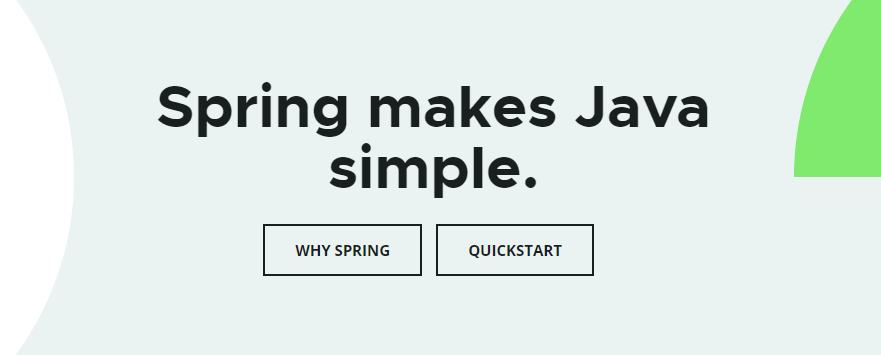
Spring is a lightweight application development framework that is known for being a support to various frameworks such as Struts, Hibernate, Tapestry, EJB, JSF, etc. This framework follows the MVC architecture pattern that uses Java, and it can build simple to the most complex applications as it is quick and adaptable. Spring has a dynamic structure that allows you to solve various technical problems in your use. Other tasks such as dependency injection, database interactions, etc. can be managed easily. Spring is apt for standalone GUI applications, applets, and web-based applications.
-
-
- Features: Lightweight, Transaction Management, Integration with other Frameworks, Container, Aspect-Oriented Programming (AOP), Inversion of Control (IOC), MVC framework, and JDBC exception handling.
- Who uses Spring?: Accenture, Fitbit, MIT, Intuit and many others.
-
5) Rails
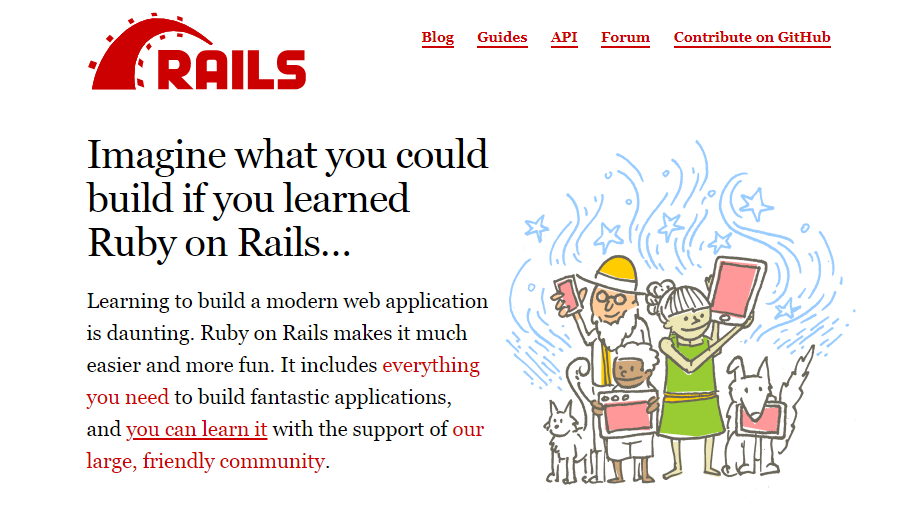
Famed as a beginner-friendly server-side framework, Rails is an MVC framework that uses Ruby. This open-source framework’s sole purpose was to make programming fun and interesting hence it allows easy integration with any third-party apps. This Ruby-based framework will enable developers to use a built-in structure for repetitive tasks. Rails are high in demand because apps created using the Rails framework are engaging and alluring. This scenario, preferably, comes in use for building social media platforms and cloud-based apps.
-
-
- Features: Highly scalable, Open source makes it web app friendly, Built-in library of text files, and simple coding.
- Who uses Rails?: Github, Airbnb, Basecamp, Scribd, Hulu, Crunchbase, Slideshare, Zendesk, Yellow Pages, Shopify, Square, and many more.
-
6) React
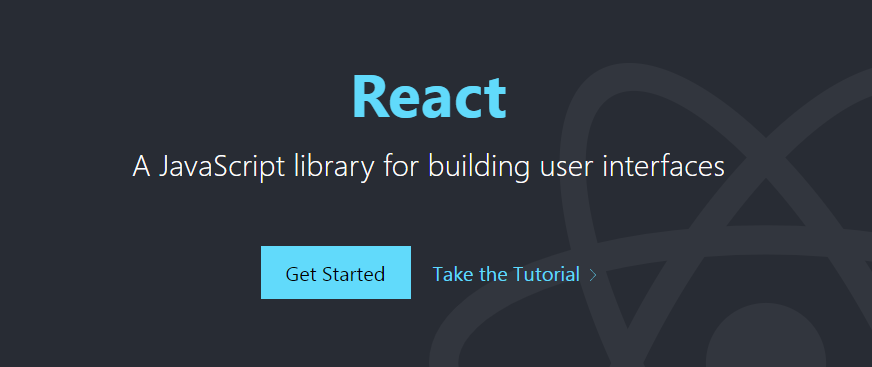
React is not a framework; however, it is one of the best and most widely used front-end JavaScript libraries; hence it made it to this list of the best web development frameworks for programmers. Facebook introduced ReactJS for both web and mobile development after the library was released; it became popular because of its revolutionary development approach. The component-based architecture feature helped it to gain more popularity. The simple, straightforward, and intuitive interface makes it easy for developing any web application. React is generally used to modify vital data or web app without loading the entire app again. React can be used only to create complex, sophisticated, and robust web apps and build applications for Android and iOS devices.
-
-
- Features: Dynamic web applications, Quick development, SEO-friendly features, Easy to Learn, Community Support, Virtual Document Object Model, and JSX.
- Who uses React?: Facebook, Mattermark, Tesla, Atlassian, Reddit, and Cloudflare
-
7) Angular
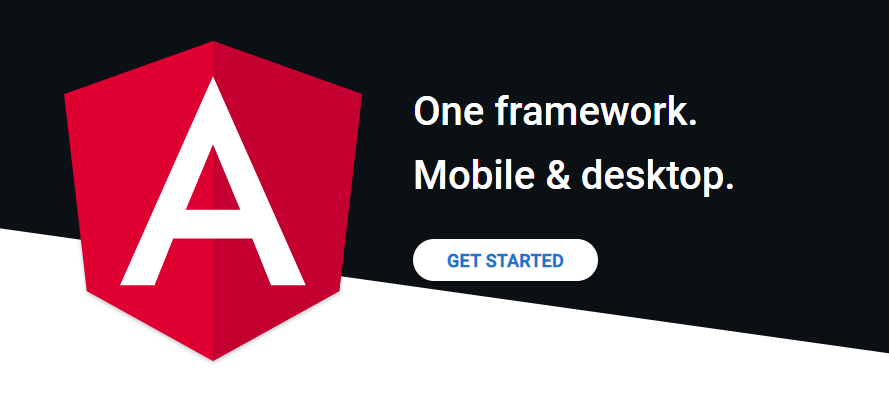
Google developed Angular as a JavaScript-based front-end framework. Angular is every programmer’s choice of framework for developing massive and dynamic client-side applications because of it’s easy to maintain features. It trims down the overall app development time and increases the app performance because of its data-binding and dependency injection feature. It is suitable for creating highly interactive single-page web applications.
-
-
- Features: Community Support, Language Service, New default browser Configuration, Compiler Update, Localization, Router, Code Splitting, Documentation, Effective Template Syntax, Debugging, and Enhanced Testing.
- Who uses Angular?: Forbes, Microsoft Customers, Google Express, Microsoft Office Home, Delta and many more.
-
8) Ember
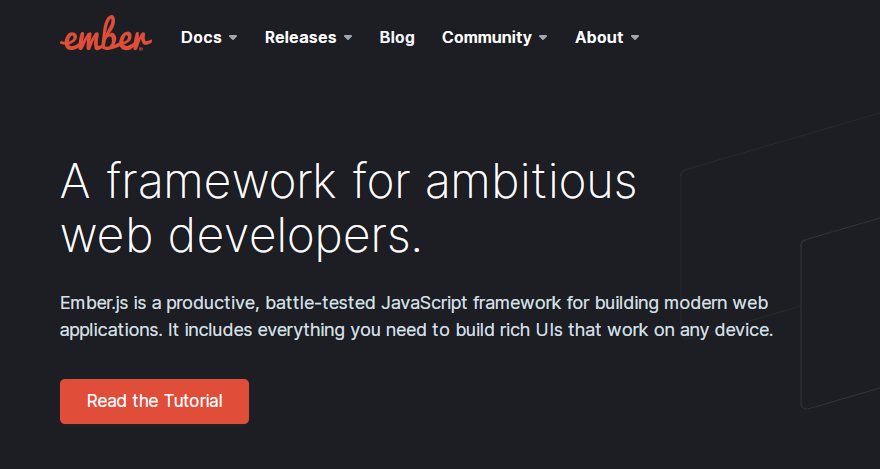
Ember is the youngest among the most popular web frameworks list. Ember was recognized as the best JavaScripter in 2015, and since then, it has gained immense popularity among the developer’s community. Ember demands minimal efforts to integrate variety in each application. This user side front-end framework is perfect for single-page web applications and complex interactions and has become developer’s favorite for its scalability and flexibility.
-
-
- Features: Easy Development, Community, Integration, Static Files, Connects with other databases, In-built data layer, Documentation, and Browser Extension.
- Who uses Ember?: Heroku, Netflix, Microsoft, Google, Square, Twitter, and Groupon
-
9) Vue

Vue is a famous JavaScript library that can come in use to create dynamic applications on the front end. Since its inception, it gained popularity because of its progressive feature. Hence if you process a current project, then you integrate Vue as a part of the project, and things will work flawlessly. Its component-based architecture and the Vue ecosystem comes in best use to develop robust front-end applications. It is ideal for single-page applications, asynchronous components, prototypes, and server-side rendering.
-
-
- Features: Lightweight, In-built Library, and Data Binding
- Who uses Vue?: Netflix, Xiaomi, Facebook for Newsfeeds, Adobe’s Portfolio, Grammarly’s interface and many more
-
10) Backbone
Backbone is written in JavaScript; the front-end framework is exceptionally light and is perfect for single-page applications. It comprises an extremely small library for the functionality it offers. It provides a structure to your web application while featuring key-value binding, rich API, and customized events. It works as per the MVC architecture and allows you to create modular code.
-
- Features: Simple Development, Open-Source Library as well as Community Assistance.
- Who uses Backbone?: Trello, BitBucket, Reddit, LinkedIn and many more.
Key Takeaways
There are numerous front-end and back-end frameworks out there, each with its unique feature and Pros and Cons. Each of these frameworks of choice is dependent on the level of the task being conducted and the functions you intend to achieve. As highlighted, each of these web app frameworks comes with a variety of features and services.
Considering the fact Rails is enormously suitable for small applications whereas, on the other hand, Django is best suited for building enterprise-level web applications. Its computation capabilities make it the best choice for machine learning deployment; similarly, React Native is preferred famous for its cross-platform development capabilities and code reusability.
Choosing the right web application framework maximizes your development speed and helps gain momentum. However, the question remains: Which framework to choose as per the project.
Feel free to anytime reach out to us to execute your new or on-going projects or consultation regarding the best framework for your future small or enterprise-level project requirements.
Keep reading hulu cons



